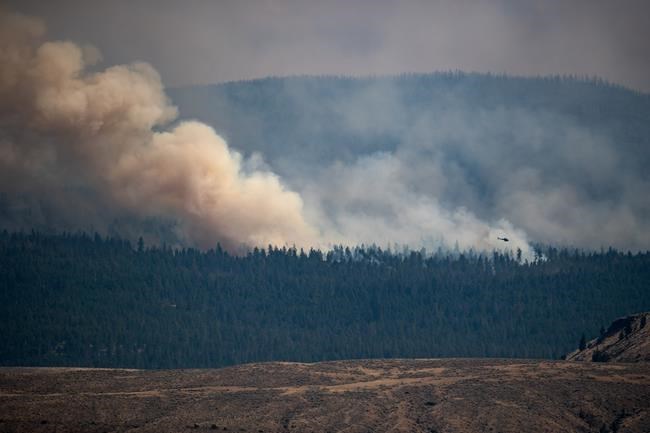CASTLEGAR, B.C. — British Columbia's premier is vowing to continue supporting the tourism industry, which was hoping to begin its recovery from COVID-19 just as hundreds of wildfires ignited in the province.
John Horgan said Wednesday the B.C. government will build on close relationships it formed during the pandemic with businesses and workers to deliver the help they need.
"We have been there for over a year and a half to make sure that we are stabilizing them, making sure they have the capital they need to keep operating, and we will continue to do that," Horgan told a news conference from Castlegar.
"We have made sacrifices as British Columbians, businesses, communities, individuals, for the past year and a half. And we have more sacrifices to make as we come through what is another potentially historic fire season."
Horgan toured wildfire operations in the Kootenays on Wednesday as some 300 blazes burned across B.C.
Hundreds more British Columbians joined the thousands already forced from their homes by wildfires as the Regional District of Central Kootenay ordered residents to get out Thursday morning ahead of a nearby fire.
Horgan urged anyone under an evacuation order or alert to follow the direction of emergency personnel.
"For those living through yet another horrific fire season, this is a graphic reminder of how climate change is with us, not just intermittently, but all the time," Horgan said.
Officials are in talks with the United States and Australia about potential support in fighting the fires, but COVID-19 and the wildfire situation elsewhere is limiting the help that's available.
Australia is under a COVID-19 lockdown, although it has committed equipment and management personnel, while Washington, Oregon and California are fighting their own fires, Horgan said.
"We have a coastal challenge right now, so the resources that we would have relied on in the past are fully occupied in their home jurisdictions when it comes to the U.S."
However, more than 3,000 firefighters and support staff are on the fire lines, including crews from Alberta, New Brunswick and Quebec, while about 100 firefighters from Mexico are due to arrive this weekend. The federal government is also sending 350 Canadian Armed Forces members to help with the province's wildfire efforts.
Horgan said new powers unlocked by a provincial state of emergency that came into effect Wednesday allow the government to make additional accommodation available for evacuees, ranging from hotels to university dorm rooms.
Thankfully, he said evacuations aren't anywhere near those seen in 2017 and 2018, British Columbia's worst fire seasons on record, but the state of emergency allows officials to prepare.
He encouraged anyone with trips planned near the fire zones to check with local resources, including their accommodation providers, to ensure it's safe to travel before leaving.
J.J. Belanger, vice chair of the Tourism Industry Association of B.C., echoed the suggestion, saying the best thing travellers can do is plan ahead by contacting local destination marketing organizations and chambers of commerce to learn if there's any imminent fire danger.
It's critical for people who change their plans to ensure they can be accommodated at their new destination, he said.
"We have people coming to Tofino every day with no reservations saying they had to change their plans, but we are completely booked so we're having to turn people away. So that's another dangerous situation," Belanger said.
The industry is focused on helping to keep people out of harm's way and many hotels have stepped up to give evacuees rooms and meals, but resources are strained, he said.
The B.C. Hotel Association has said many hotels can't operate at full capacity, with about 30,000 tourism and hospitality jobs unfilled because of the pandemic and travel restrictions.
"The tourism industry is coming to the rescue in times of need, but also it's the worst possible time that this could happen," Belanger said of wildfires. "The industry is reeling from COVID and this is just putting another nail in the coffin of the tourism industry. It's really devastating."
Myles Karn, owner of Top Cat Tours in Penticton, said the company's staff worked hard to reopen after COVID-19 restrictions on non-essential travel were lifted three weeks ago.
They fielded a stream of cancellations when the state of emergency was declared. About 120 people have cancelled tours set to take place during the rest of this week, he said.
“Within the last 24 hours here, we’ve gone from basically being sold out to trying to, you know, get back on our feet, steady and move forward," Karn said.
Penticton is located north of wildfires that have prompted evacuation orders around the communities of Okanagan Falls, Oliver and Osoyoos. It's also south of Kelowna and a wildfire burning near Peachland.
There has been some wildfire smoke in Penticton, Karn said, but most wineries, hotels, restaurants and other stops the tour company is partnered with are open for visitors.
“We’re trying to be professional and offer as much compassion, if you will, to the situation about people’s travel plans being affected and those refunds that are associated with it.”
Karn said he applied for the B.C. COVID-19 grant program for tourism businesses in February and the money was deposited in his bank account Wednesday.
Some staff left while the company waited for the funds, he said, and he planned to use the money to refill the vacant positions.
— By Amy Smart and Brenna Owen in Vancouver.
This report by The Canadian Press was first published July 21, 2021.
___
This story was produced with the financial assistance of the Facebook and Canadian Press News Fellowship.
The Canadian Press



